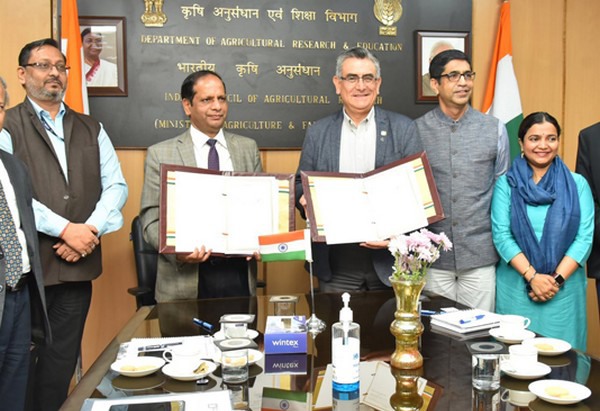With almost 18 percent of the world’s population but less than 1.5 percent of its farmland, India has prioritized increasing agricultural productivity, farmer income, and country-wide food security. The International Potato Center (CIP) has contributed to those objectives for nearly 50 years by collaborating with Indian institutions and farmers to harness the potential of root and tuber crops to produce more nutritious food on the same land and, often, with less water than other crops.
CIP has collaborated for decades with the Indian Council of Agricultural Research (ICAR) by sharing breeding material, building capacity, and improving seed systems. More recently, CIP has also promoted sustainable, climate-resilient agronomic practices. That collaboration is entering a new phase as CIP and ICAR leadership recently signed a five-year work plan.
Oscar Ortiz, interim Director General of CIP and Senior Director of Crop Based Systems in CGIAR, traveled to India last week to meet with Manoj Ahuja, Secretary of Agriculture and Farmers Welfare, Himanshu Pathak, Director General of ICAR and Secretary of the Department of Agricultural Research and Education, and Anand Kumar Singh, Deputy Director General for Horticulture at ICAR, and to sign a collaborative work plan for the next five years. Ortiz joined Samarendu Mohanty, CIP Regional Director for Asia, and Sampriti Baruah, Asia Project Coordinator, in sharing details of CIP’s contributions to Indian agriculture and discussing common goals for the coming years.
“CIP and ICAR have been collaborating since 1975, and from the beginning, CIP has been committed to making its technologies available, particularly potato germplasm for use in breeding improved varieties,” Ortiz said.
“Over the next five years, CIP will be working in close partnership with the Central Potato Research Institute using CIP germplasm to develop market-demanded potato varieties and, in tandem with the Central Tuber Crops Research Institute, toward the release of at least one orange-fleshed sweetpotato variety,” said Mohanty.
Based on consultations with scientists at ICAR’s Central Potato Research Institute and Central Tuber Crops Research Institute, the new agreement proposes an interdisciplinary approach for the next five years (2022-2027). Research will be conducted at a system level to address the food and nutrition security of millions of smallholders in rice-based cropping systems, and will be organized under the following five themes:
- Developing market-demanded potato varieties using CIP germplasm & breeding clones;
- Field trials and release of pro-vitamin-A biofortified orange-flesh sweetpotato;
- Cropping systems and natural resource management under changing climates;
- Socio-economic, gender, value chain, marketing, adoption and impact assessment;
- Integrated capacity building of national scientists.
For more information: cipotato.org











